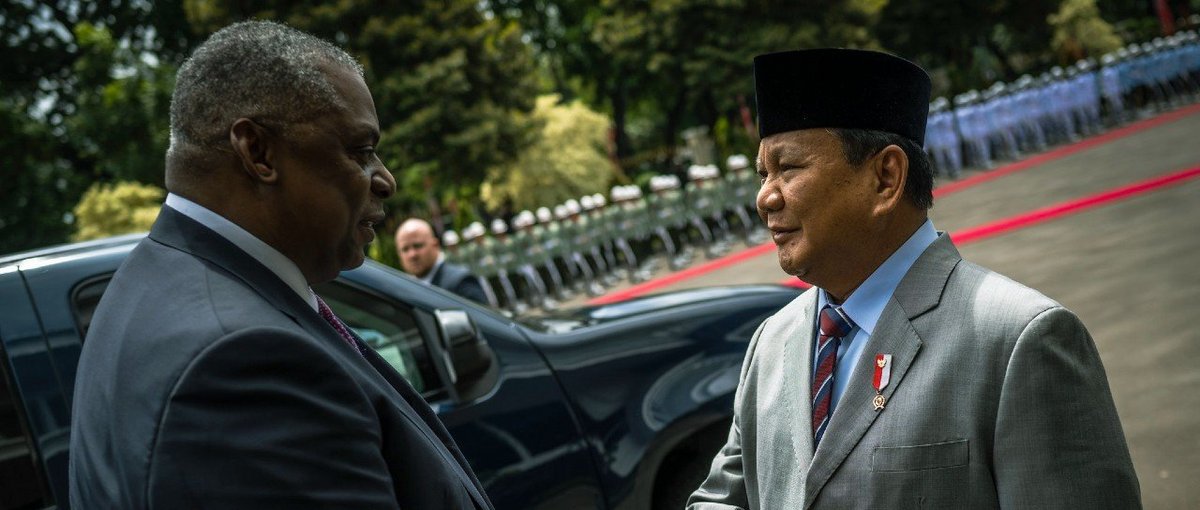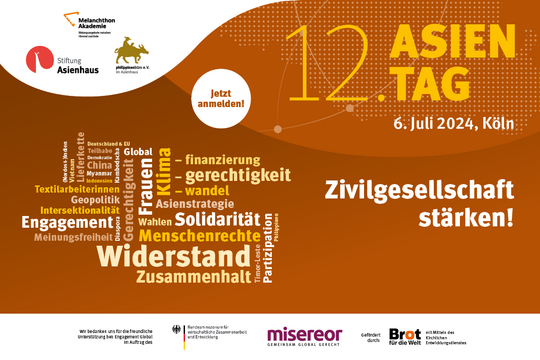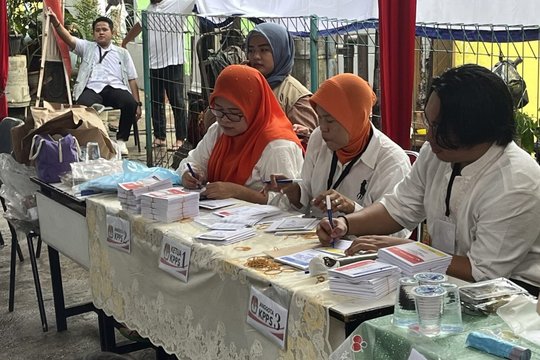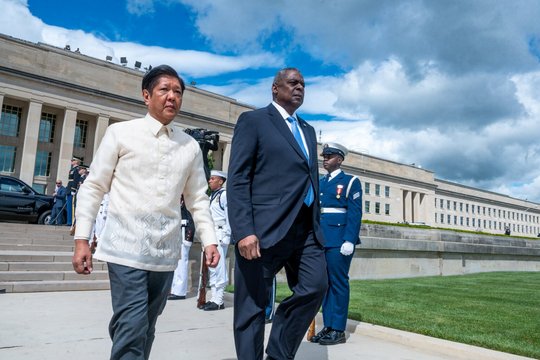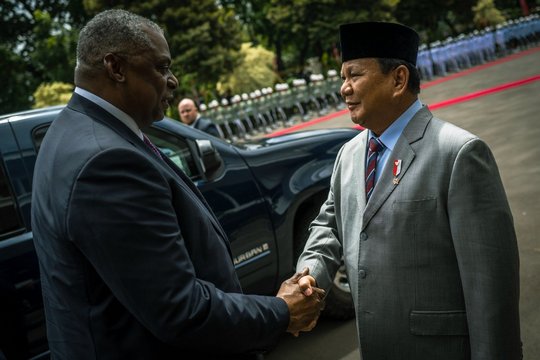“I think that’s enough, everything is quite clear.”
This was the succinct conclusion of Prabowo Subianto’s press conference after the last presidential debate on February 4, 2024. Following his statement, he promptly departed, exchanging pleasantries with his high-profile allies and ignoring the moderator’s cue to engage with the press. This marked another instance of Prabowo’s unfriendly demeanor towards the media, reminiscent of his behavior when he ran for the first time. During the 2014 presidential election, he dismissed a question from The Jakarta Post, labeling its owner as a “bastard”. On a different occasion, he questioned a Kompas TV reporter’s presence in his house, openly alleging unfairness by the Kompas media group. Whether this was part of a Trump-like strategy or a genuine sentiment, Prabowo frequently voiced his disdain for what he perceived as media bias favoring his rival-turned-ally, Joko Widodo (Jokowi).
Tense relationship between Prabowo and the media
The consistent pattern highlights the strained relationship between Prabowo and the media, indicating a lack of amicability. These manners seemingly contradicted his promise made precisely a month before that debate, when he visited Indonesian Journalists Union (PWI) and stated, “Freedom of the press is [a system of] checks and balances, to put the rulers in check”. Now, with the Indonesian election results showing Prabowo leading in quick and real counts, securing at least 57% of the vote, concerns linger about the potential implications for freedom of the press and expression under his presidency.
Prabowo’s campaign centered on the idea that he is the man who will continue the programs and achievements of the outgoing President Jokowi. This strategy included efforts to moderate his public image, from the ill-tempered populist general to an adorable, cuddly grandfather persona known for his enthusiasm for dancing. Despite the backing from the incumbent coupled with attempts to present a softer and more approachable facade, Prabowo, however, is not Jokowi. They hail from starkly opposite backgrounds. Jokowi was a civilian with no prior political connections, while Prabowo came from a wealthy, influential family, solidified by his marriage to the daughter of the late dictator Suharto. While voters might be prone to forgetting the old depiction of Prabowo, the media should be able to vividly remember it — an explosive strongman with authoritarian tendencies.
Given their different, if not contrasting, personalities, it is likely that Prabowo will govern in his own right rather than merely serving as the proxy for Jokowi. His communication style with the media is expected to deviate from that of the president as well. For instance, Jokowi used to be a media darling, at least until he was re-elected. He adeptly embraces media attention, asserting that it has made him more prominent. Jokowi also leveraged the coverage to cast his family into the spotlight with a portrayal of modesty.
While many of Jokowi’s interactions with journalists were marked by jest and levity, Prabowo tended to gaslight them. One notable instance took place during his 2019 election campaign when he issued a warning to the media, stating, “Watch your step, we are taking note of each of your behavior.” At the same event, he further lambasted the press, alleging that they had played a role in undermining Indonesian democracy by “fooling the people.” Moreover, Prabowo often opted to avoid responding to attacks directed at him or providing clarifications to the media, dismissing them as unfair reporting. Yet, when certain news outlets favored his viewpoints and served his interests, he refrained from making a fuss.
Press and digital freedom in Jokowi’s Indonesia
The unease surrounding the election outcome is not solely due to Prabowo’s temperament and his bad blood with the media; it also arises from the status quo he embodies. Regardless of the jovial exchanges with reporters and the incumbent’s remarks on respecting the media, Jokowi’s presidency left a concerning legacy on freedom of the press. The Indonesian Press Legal Aid (LBH Pers) reported 87 attacks on journalists in 2023, surpassing the 51 cases recorded in 2022. Despite non-state entities being primarily responsible for the assaults, it highlights the government’s shortcomings in providing legal safeguards for journalists as they carry out their indispensable watchdog role.
On a parallel note, a regression in digital freedom of expression became apparent during Jokowi’s tenure. The recent “Freedom of Internet” report categorized Indonesia as “partly free,” awarding it a score of 47 out of 100 points. This marks a continuous decline from 2016, when Indonesia garnered 56/100 points and a “free” classification. This decline is attributed to various governmental measures such as internet shutdowns and surveillance. Illustrative instances of government control include the shutdowns in September 2019 following a riot in Wamena, Papua, and in February 2022 during protests against the andesite mine in Wadas, Central Java.
Additionally, the national police have established a “Cyber Unit” tasked with monitoring individuals’ social media activities. They are armed with the vague anti-fake news law (UU ITE), which has been increasingly utilized since its first amendment in 2016, allowing the government to control online platforms and censor critics. This has resulted in the imprisonment of not only journalists but also activists and civilians expressing critical views towards the government. Fearing similar repercussions, journalists frequently resort to self-censorship, while the public feel unsafe in expressing their views openly.
Prabowo’s litmus test for democracy
With Prabowo’s consistent anti-media gestures, it should come as no surprise that the idea of him being a president also sparks growing apprehension among media workers. Of the three candidates, he stands out as the greatest threat to press freedom in the eyes of many journalists. Furthermore, his stance on maintaining continuity suggests a lack of urgency in addressing these pressing issues.
Backed by his and Jokowi’s devoted loyalists, Prabowo might adopt a more stringent stance towards his critics. Recent actions by Prabowo’s circle, such as their attempt to criminalize the director and three legal experts of a journalistic film discussing allegations of systematic fraud in the 2024 election, signal their anti-critical nature and readiness to suppress dissent. All of these factors combined indicate that under his leadership, press persecution and criminalization of activists would not only persist but potentially escalate. In the face of this looming reality, we should approach Prabowo’s impending presidency with utmost caution. A resurgence of the notorious press crackdowns reminiscent of the Suharto regime would be highly undesirable.
To mitigate these valid agitations, it is vital for Prabowo to treat journalists better, and that begins with showing respect. Using the presumptive next president’s own words, the media should be able to freely criticize the government when something is wrong, even if the criticism is harsh. Ensuring their ability to safely fulfill their duty in upholding democratic principles — holding the president accountable — is how Prabowo can prove that he is truly committed to democracy, as he often professes.
Read this commentary in German: Bedroht Prabowos Präsidentschaft die Meinungs- und Medienfreiheit in Indonesien?
Guest commentary by Viddy Ranawijaya and Teuku Harza Mauludi.
About the authors:
 Viddy Ranawijaya is a doctoral researcher at the Willy Brandt School of Public Policy at the University of Erfurt. He passionately delves into the intricate research realms of political topics, digitalization, diversity & inclusion, and the internationalization/regionalization of higher education.
Viddy Ranawijaya is a doctoral researcher at the Willy Brandt School of Public Policy at the University of Erfurt. He passionately delves into the intricate research realms of political topics, digitalization, diversity & inclusion, and the internationalization/regionalization of higher education.
 Teuku Harza Mauludi is a Master of Public Policy graduate from the Willy Brandt School of Public Policy at the University of Erfurt. Currently, he is working as a research intern at the German Institute for Global and Area Studies (GIGA). He has a keen interest in the shrinking civic space and digital inequality.
Teuku Harza Mauludi is a Master of Public Policy graduate from the Willy Brandt School of Public Policy at the University of Erfurt. Currently, he is working as a research intern at the German Institute for Global and Area Studies (GIGA). He has a keen interest in the shrinking civic space and digital inequality.


